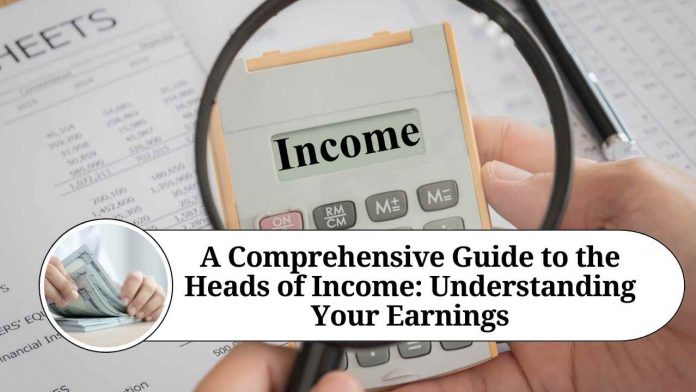Introduction
In today’s complex financial landscape, it is essential to have a clear understanding of the various sources of income that contribute to our financial well-being. Income is the lifeblood of our economic existence, enabling us to meet our needs, pursue our dreams, and build a secure future. To navigate the world of personal finance effectively, it is crucial to comprehend the different heads of income and how they impact our financial lives. In this blog post, we will explore the various heads of income and shed light on their significance.
- Salary Income:
Salary income is the most common and straightforward form of earnings for most individuals. It includes the compensation received from employment or services rendered by an individual to an employer. This head of income encompasses regular salaries, wages, bonuses, commissions, allowances, and any other monetary benefits received from an employer. Salary income is typically subject to taxation under the applicable income tax laws of a country.
- Business and Professional Income:
Business and professional income refers to earnings generated from a self-employed or professional practice. This category includes profits derived from business ventures, such as sole proprietorships, partnerships, or limited liability companies. It also covers income earned by professionals like doctors, lawyers, accountants, and consultants who provide services independently. Business and professional income is subject to specific tax regulations, including provisions for deductions and exemptions related to business expenses.
- Rental Income:
Rental income arises from owning and leasing out properties such as residential houses, commercial buildings, or land. It includes the rent received from tenants and any additional charges for facilities or services provided. Rental income can be an attractive source of earnings, but it also involves responsibilities like property maintenance and adhering to legal and regulatory obligations. Taxation rules vary for rental income, with deductions allowed for expenses like property repairs, mortgage interest, and property management fees.
- Capital Gains:
Capital gains are profits earned from the sale of capital assets, such as real estate, stocks, bonds, mutual funds, or precious metals. When the selling price of an asset exceeds its purchase price, the difference represents a capital gain. Conversely, if the selling price is lower than the purchase price, it results in a capital loss. Taxation of capital gains depends on the holding period of the asset and the applicable tax laws of a jurisdiction. Some countries differentiate between short-term and long-term capital gains, with varying tax rates for each.
- Interest and Dividend Income:
Interest and dividend income are earnings derived from investments in financial instruments. Interest income is generated by lending money to individuals, corporations, or financial institutions, usually in the form of fixed deposits, bonds, or savings accounts. Dividend income, on the other hand, represents the distribution of profits by companies to their shareholders. Both interest and dividend income may be subject to tax, although tax rates and exemptions can differ based on the country and the type of investment.
- Pension and Retirement Income:
Pension and retirement income include payments received by individuals after they cease regular employment. These earnings typically originate from pension plans, annuities, government-sponsored social security schemes, or personal retirement savings accounts. Pension and retirement income play a crucial role in ensuring financial stability during the golden years of one’s life. Taxation of these earnings varies, with certain exemptions and deductions available to retirees.
Conclusion
Understanding the different heads of income is essential for effective financial planning and decision-making. Each source of income has its unique characteristics, legal implications, and tax treatments. By comprehending the various heads of income, individuals can optimize their earnings, take advantage of tax incentives, and ensure long-term financial security. Consulting with financial advisors or tax professionals can provide further guidance tailored to specific circumstances.
Other Related Blogs: Section 144B Income Tax Act
Frequently Asked Questions (FAQs)
Q. What is the difference between salary income and business income?
Salary income refers to the compensation received from an employer for services rendered as an employee. It includes regular salaries, wages, bonuses, and allowances. On the other hand, business income is derived from a self-employed or professional practice, such as owning a business or working as a freelancer. Business income includes profits generated from the operations of the business, after deducting business expenses.
Q. Is rental income taxable?
Yes, rental income is generally subject to taxation. The rental income earned from properties such as houses, apartments, or commercial buildings is considered a part of your total income and is subject to income tax laws. However, you may be eligible for deductions on expenses related to property maintenance, repairs, and other costs associated with generating rental income.
Q. What are capital gains and how are they taxed?
Capital gains are profits earned from the sale of capital assets, such as real estate, stocks, or bonds. When the selling price of an asset exceeds its purchase price, the difference represents a capital gain. The taxation of capital gains varies depending on factors such as the holding period of the asset and the tax laws of your jurisdiction. In some cases, long-term capital gains may be taxed at a lower rate than short-term capital gains.
Q. Do I have to pay tax on interest and dividend income?
Interest and dividend income earned from investments in financial instruments are generally subject to taxation. The tax treatment may depend on the type of investment, the amount of income earned, and the tax laws of your country. Some jurisdictions provide certain exemptions or reduced tax rates for interest and dividend income up to a certain threshold.
Q. How is pension and retirement income taxed?
Pension and retirement income are taxable in most countries. However, the tax treatment may differ based on factors such as the source of income (government pension, private pension, retirement account), the age at which you start receiving the income, and any applicable exemptions or deductions. It is advisable to consult with a tax professional to understand the specific tax rules related to pension and retirement income in your jurisdiction.
Q. Can I claim deductions on business expenses?
Yes, if you earn business income, you are generally allowed to claim deductions for legitimate business expenses. These may include expenses related to operating your business, such as rent, utilities, salaries, marketing expenses, and professional fees. However, it is important to keep proper records and ensure that the expenses claimed are genuine and necessary for conducting your business.















